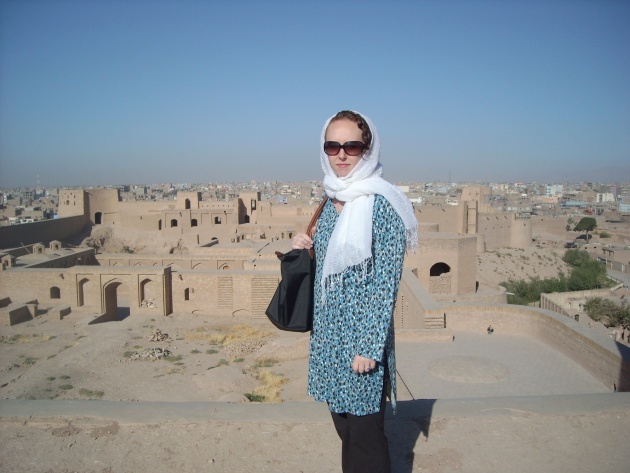Daniella M.Ferry is senior consultant who works in Herat Incubator and provides consultation for Incubator company residence. Below is an interview of her about Afghanistan, education and central/south Asia.

FA: Please tell us about yourself and your background?
DF: I hold a bachelor's degree in International Relations and Economics from Michigan State University in East Lansing, MI, USA. I have several years of experience in Educational programming, Federal Acquisitions, and Business Development. For the past three years, I have been working as a Business Consultant for the United States Public Sector . I started working as a Business Advisor at the Herat Incubator Program in June 2012.
FA: What do you look for in the projects and partners you work with?
DF: We look for businesses and organizations that have realistic, attainable goals. Another thing that is important for us is making sure our partners will survive the military drawdown. If a business is built entirely to cater to the ISAF/NGO presence in the country, it's not a sustainable business model. We want to see businesses that are focused on the local (Afghan) market, producing goods and services that Afghans want to buy.
FA: What is social media's role in your business? How much do you use it and how?
DF: We try to use social media to spread awareness of the program. To be honest, I wish we used it more to create virtual collaboration spaces for our clients.
FA: Can online advertising influence a digital, cultural revolution? If yes, how so?
DF: Of course! The digital media age has caused all kinds of cultural changes already and I'm sure it will continue to have an influence on our generation. The entire range of market transactions is changing - what was once only a face to face action is rapidly becoming something we only want to do online. We also have so much more information when we make purchases now. Consumers have so much information on product price and quality that they really hold the "upper hand" when they want to buy. Merchants can't just blindly lie to customers to get them to buy things, because in most cases, consumers should already know about what they are buying before they purchase.
FA: Where do you see the future of developing countries like Afghanistan? Do you think online advertising and social media can help improve their economy and education system
DF: One of the great things about social media and technology in general is that it can bring together people who are geographically and culturally separated - and it brings them together on equal ground. If technology helps bring change to the economy and educational system, it will be because of that unifying effect. It can bring together buyers and sellers, investors and capital-seekers, teachers and students. I love the example of the phone application available in Afghanistan which teaches people to read. Very few in Afghanistan own a computer or have regular internet access - but nearly everyone has a phone! How else would other working-class people who have to work to earn money be able to find a "teacher" to learn to read in their spare time? It's a great example of how technology can be used to improve education in countries like this.
FA: Can Central and South Asia be the cradle of a new economic growth with its cultural and economic diversity?
DF: I think economic growth will happen in Central and South Asia eventually, but for the region to become a true economic leader, governments AND individuals have to agree that they are committed to progress. People can't be comfortable with the status quo if they want to be leaders in economic growth. Look at the "Asian Tigers" of the 1990's or Ireland in the early 2000s - in both cases, the government and the people both were willing to embrace new business ideas and new political policies to support those business ideas. Central and South Asian countries will be best situated to become economic "tigers" themselves if they are willing to use their diversity to generate ideas together, rather than letting the diversity of their ideas drive them apart. It's hard to know when, or even if, that will happen. That's not something that comes from the outside - it's not something that NGOs or the International Military Forces can "teach" . It has to be embraced from within the country, from within the region.



